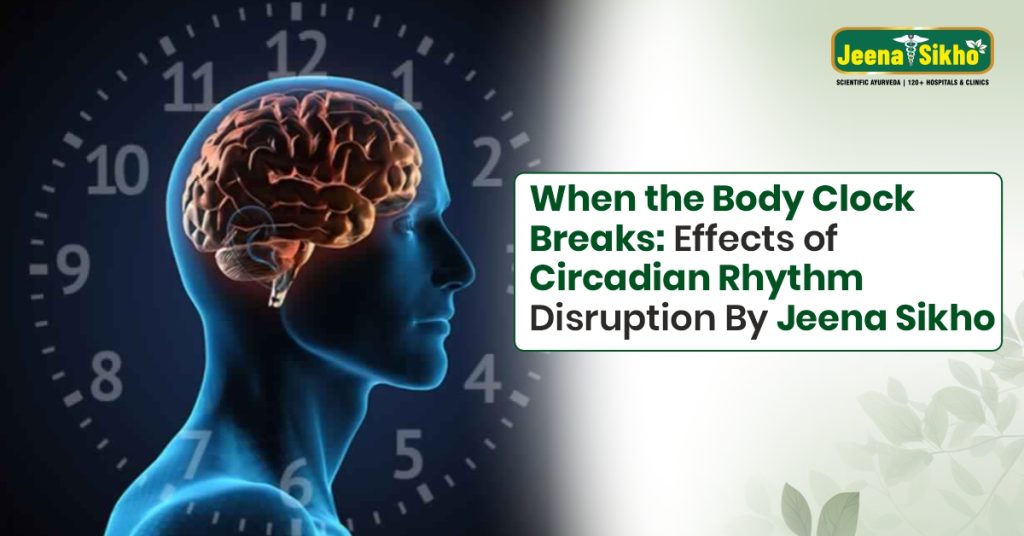The circadian rhythm is a 24-hour natural cycle in which our body functions, also called our body clock. This clock regulates sleep, vitality, digestion, and hormones. When this clock is disrupted, it may have numerous effects on the body and the mind. The effects of circadian rhythm disruption are not only being sleepy but may also impact the mood, weight, digestion, heart conditions, and well-being in general.
Things like staying awake late, travelling across time zones, using phones or TV too much, or having irregular sleep can cause disrupted circadian rhythm effects. The body has a natural clock; even minor changes, such as sleeping on weekends or eating irregularly, can mislead the natural clock. Learning this can help you avoid health complications and feel healthy.
Ayurvedic View of Circadian Rhythm
The ancient science of life, Ayurveda, advocates living in connection with nature. A messy daily schedule can cause body clock imbalance, leading to poor sleep, low energy, and mood swings. Ayurveda suggests waking up early, eating meals simultaneously daily, and sleeping on time.
Herbs like Ashwagandha and Brahmi calm the mind, help you sleep better, and support the nervous system. Yoga, meditation, and warm oil massage help the body return to its natural rhythm. These simple habits decrease the health risks of circadian disruption and increase energy, focus, and overall wellness.
Disrupted Circadian Rhythm Effects
When your body clock is out of rhythm, it can lead to confusion. The effects of circadian rhythm disruption can begin small, but with time, they can worsen.
-
Sleep Problems
The first symptom is often trouble sleeping. You may find it hard to fall asleep, wake up at night, or feel very tired during the day. Lack of sleep can lower immunity, impair focus, and make you irritable. These are typical circadian rhythm disorder symptoms.
-
Hormone Problems
Hormones like melatonin, cortisol, growth hormone, and reproduction-related hormones follow the circadian rhythm. Poor sleep can reduce melatonin at night and raise cortisol at the wrong time. It can make one feel tired, have mood swings, have low energy, and even be infertile.
-
Metabolism Problems
Circadian disruption influences hormones that regulate hunger and energy, as well as insulin, leptin, and ghrelin. Late or inconsistent eating may leave you feeling hungry, gain weight, or experience blood sugar problems. In the long term, this increases the chances of diabetes, obesity, and other conditions.
-
Mood and Mental Health
An irregular body clock may disrupt brain chemicals, resulting in anxiety, depression, irritability, or a poor ability to focus. And even minor sleep distractions will leave you feeling exhausted and unfocused.
-
Heart Problems
Long-term circadian disruption can harm the heart. It can raise blood pressure, cause irregular heartbeat, or increase the risk of heart disease. Having a good body clock indicates that your heart is safe.
-
Other Signs
Other warning signs include stomach ailments, low immunity, headaches, lack of motivation, and fatigue. You may crave sweets, notice hormone changes, or take longer to recover from sickness. Watching for these circadian rhythm disorder symptoms early can prevent serious health issues.
Ayurvedic Treatment of Circadian Rhythm Disruption.
Ayurveda provides natural methods of correcting the body clock imbalance and restoring its normal state.
-
Daily Routine
- Wake up early, before sunrise.
- Eat breakfast soon after waking and keep meals consistent every day.
- Avoid heavy dinners; eat light at least 3 hours before bed.
- Have short naps or meditate throughout the day to relieve stress.
-
Herbal Support
Such herbs as Ashwagandha, Brahmi, Tulsi, and Jatamansi relieve stress, act as a sleep solution, and restore healthy hormones. You can relax your mind and body in the evening by drinking herbal teas.
-
Yoga and Meditation
Mind and body are related through yoga postures, or simple breathing exercises (pranayama). Meditation calms the mind, lowers stress, and helps regulate sleep. Doing this regularly improves focus, mood, and emotional stability.
-
Massage and Relaxation
Abhyanga or self-massage using warm oils, benefits the body, enhances blood circulation, and softens the nervous system. This improves sleep and restores the body’s normal rhythm, which diminishes the health risks of circadian disruption.
-
Simple Lifestyle Habits
Stay peaceful in your environment, do not watch screens before bed, show appreciation, and get out into nature. To sleep better and have hormonal balance, avoid caffeine and alcohol in the evening.
Final Words
Disturbance of circadian rhythm may impact sleep, mood, metabolism, and general health. Ignoring them may cause weight gain, diabetes, heart problems, and mental health problems. The Ayurvedic lifestyles, such as herbs, yoga, meditation, massage, and a good daily routine, naturally correct the body clock imbalance and minimise the health risks of circadian disruption. By adhering to these tips, you will be better and more energetic and enjoy a healthy life.
Naturally, restore your body clock with HiiMs (Jeena Sikho). To balance your mind and body, our expert doctors use such herbs as ashwagandha and Brahmi, yoga, meditation, and warm oil massage. Begin today to have better sleep, more energy, and wellness.
FAQs
What happens when the circadian rhythm is disrupted?
It makes you feel tired, moody, and weak in daily life.
How can I tell if my body clock is off?
Trouble sleeping, low energy, and odd hunger times show it’s disturbed.
How does Ayurveda help with a disturbed body clock?
Ayurveda balances life with herbs, yoga, massage, and a daily routine.
How does screen time affect the body clock?
Mobile and TV light confuse the brain and delay sleep.
Can eating at odd hours disturb my body clock?
Irregular meals confuse digestion and disturb the natural rhythm and the body clock.







